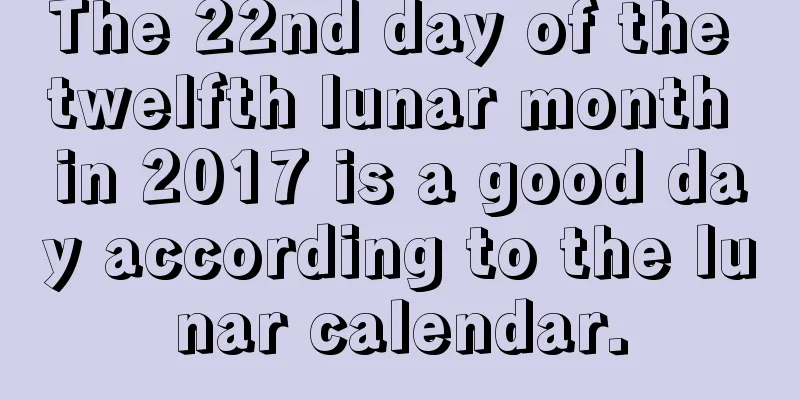What are the customs for celebrating the New Year on the fourth day of the Lunar New Year?

Introduction: The fourth day of the first lunar month is called "Big New Year" in Putian, Fujian, and the people of Putian call the New Year "Zuosui". The fourth day of the New Year is what makes Putian very different from other places. People in Putian also celebrate the Chinese New Year on the fourth day of the first lunar month, which means they celebrate the Chinese New Year again. The fourth day of the first lunar month is as lively and grand as New Year’s Eve. Are there any customs on the fourth day of the Lunar New Year? Let’s find out with the editor below! New year, new atmosphere, there are countless topics about the Spring Festival. If you want to know more about the Lunar New Year, please continue to pay attention to Mr. Shui Mo’s exclusive Spring Festival special articles for you!The fourth day of the Lunar New Year: "Celebrating the New Year"The fourth day of the first lunar month is the day when Nuwa created sheep, so it is called "Sheep Day". On this day, people cannot kill sheep. If the weather is good, it means that the sheep will be well raised in the year and the sheep farmers will have a good harvest. Sheep Day is the day when the Han people welcome gods. In the old imperial calendar, the sheep is the zodiac sign, so the phrase "three sheep (yang) brings good luck" is a symbol of good luck and is also the day to welcome the Kitchen God back to the people. On the fourth day of the Lunar New Year, the whole family eats Zheluo together. The so-called Zheluo is a hodgepodge of leftover food from the past few days, to clean up the New Year's goods. Clean the room and collect the garbage in one place, which is also called "throwing away poverty" in Han folk customs. In some rural areas in the north, on the fourth day of the Lunar New Year, people tie up a fire god by tying corn stalks or wheat stalks onto a stick, lighting it, and then sending it from their home to the river, which represents a year without fire in the home.The custom of people in the Putian area of Fujian is to celebrate the New Year around the fire again. This is a unique local custom in the country, reflecting the traditional mentality of the Han working people who generally hope to bid farewell to the old and usher in the new, to bid farewell to the poverty and hardship of the past and to welcome a better life in the new year. The fourth day of the first lunar month: the origin of "New Year's Eve"The fourth day of the New Year is what makes Putian very different from other places. People in Putian also celebrate the Chinese New Year on the fourth day of the first lunar month, which means they celebrate the Chinese New Year again. The fourth day of the first lunar month is as lively and grand as New Year’s Eve. This custom originated from the 41st year of Jiajing in the Ming Dynasty, when Japanese pirates invaded Putian, killing and looting everywhere. They did not return until they were defeated by Qi's army on the first day of the first lunar month of the following year. Since every family had to take refuge in other places and could not celebrate the New Year, they decided to make up for it on the fourth night of the New Year. In order to commemorate this tragic history, people agreed to regard New Year's Eve as the "Little New Year's Eve" and the fourth day of the first lunar month as the "Big New Year's Eve", also known as "celebrating the New Year" (Xianyou regards the "Big New Year's Eve" on the fifth day of the first lunar month). We celebrate the fifth day of the New Year as the same as the first day. Like the first day, we have fried noodles for breakfast, which is the most delicious breakfast of the year. After that, we visit each other."Celebrating the New Year": Eating the New Year's Eve dinner around the firePeople in Putian call eating New Year’s Eve dinner “weilu”. When people gather around the fire in Putian, there are also rules for the dishes on the table. Most of them have auspicious meanings and are very rich. The dish must include crucian carp (commonly known as crucian carp, which is homophonic to "积宝"), shrimp (homonymous to "和", meaning a harmonious family and harmony brings wealth), crab (choose crabs with all ten legs, implying perfection), oysters (homonymous to "在", meaning that all family members will still be in this world in the coming year). Other dishes depend on each family's preferences and financial situation. A few live fish should be kept in the water tank in the kitchen to represent abundance every year. People in Putian and Xianyou attach great importance to family ties. During the Chinese New Year, they will try every means to rush home to reunite with their families. If a relative is unable to rush home for the Chinese New Year, they will place a set of bowls and chopsticks and reserve a seat for him on the dining table. After gathering around the fire, the elders give New Year's money to unmarried men and women under the age of 16; some children give New Year's money to their parents and grandparents; and some husbands give New Year's money to their unemployed wives. The purpose of distributing New Year's money during the Spring Festival is to show love to the younger generation, respect to the elders, and love to one's wife. The second is "Ya Sui", which sounds like "Ya Sui" (meaning to ward off disasters and drive away evil spirits).Summary: The above article content is what the editor wants to introduce to readers about the origin and customs of "celebrating the New Year" on the fourth day of the first lunar month. I hope everyone can understand it and popularize the knowledge of Chinese traditional festivals! |
>>: In addition to China, these countries also celebrate the Spring Festival. What are the customs?
Recommend
Where is the God of Wealth on the 30th day of the 12th lunar month in 2018?
In the twelfth month of the lunar calendar, the c...
Is the ninth day of the eighth lunar month in 2021 a good day? Is the funeral a good idea?
Every day is different, some days are good, some d...
Where is the God of Happiness on July 6, 2017?
1. What day is the sixth day of the seventh lunar...
Will people born in the leap April of 2020 bring bad luck to their parents? Check your horoscope to see if you will bring bad luck to your parents!
Every family is looking forward to the arrival of ...
What is the date of the third day of the first lunar month in 2018 in the lunar calendar? Is it an auspicious day?
Introduction: Our country has been a country that ...
What season is Grain Full? What are the phenological phenomena of Grain Full?
During the Grain Full solar term, rivers gradually...
Where is the direction of the God of Happiness on Grain in Ear Day in 2020?
The God of Joy, as the name suggests, is a god who...
Which comes first, the Beginning of Autumn or the Autumnal Equinox? What proverbs prove this?
The plants and trees on earth, the four seasons ro...
Is it a good time to move house on the seventh day of the sixth lunar month in 2020? Is it an auspicious day?
The sixth month in the lunar calendar is the firs...
Is May 21st of the lunar calendar 2019 an auspicious day? What should we pay attention to?
Introduction: Different days have good and bad luc...
Is March 11th of the lunar calendar in 2022 suitable for breaking ground? Is it an auspicious day?
The third month of the lunar calendar is also know...
Is it good fortune for a baby born on the 22nd day of the sixth lunar month? Is it a destiny of great wealth and honor?
Introduction: The day every child is born becomes ...
Can we welcome the God of Wealth on the 29th day of the twelfth lunar month in 2019? What are the methods and rules for welcoming the God of Wealth?
Introduction: Welcoming the God of Wealth is an im...
Placement of Lucky Bamboo - Where should Lucky Bamboo be placed in 2020 for best luck?
Lucky bamboo is a Feng Shui plant that can promote...
Can I get engaged in the second month of the lunar calendar in 2022? A list of auspicious dates for engagement in the second month of the lunar calendar
In mid-February, all flowers are in full bloom. Wh...









